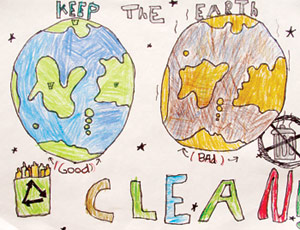In 40 years, I'll be 60. And many people reading this will probably be well past that point and edging toward geezer-hood. Some of you may not even be around anymore, though your children may be well into their adult lives, finding their places in the world. And what do we want that world to be like? Livable? Populated by diverse animal and plant life? Functioning in balance and providing clean air to breathe and water to drink? In short, do we want our delicate planet intact? I'd be surprised if the answer were not a resounding yes.

Earth Day was established to focus on realizing that desire — on thinking forward and renewing our collective commitment to protecting and caring for our home base. But first, let's look back a bit.
The first Earth Day was celebrated 40 years ago, in 1970; later that same year, the U.S. Environmental Protection Agency was formed. America was on the brink of a major change in consciousness: People were beginning to realize that nothing — not even something as seemingly big and durable as Earth — lasts forever. Sen. Gaylord Nelson of Wisconsin is widely credited with coming up with the idea for the event. "There was a great deal of turmoil on the college campuses over the Vietnam War, and many colleges held anti-war teach-ins," he recalled in a 1998 speech. "On a flight to the University of California-Berkeley, I read an article on the teach-ins, and it suddenly occurred to me: Why not have a nationwide teach-in on the environment?"
The birth of Earth Day signaled a new awareness, and the energy crisis of the '70s sparked the realization that this small planet that is essentially all we've got could actually "wear out." People began asking the question, "Earth's got our back; have we got hers?" And now, amid the current climate crisis, people are asking the same question once again.
Searching news archives for accounts of Earth Days past, I found a 1970 article describing a demonstration in Hendersonville by about a 100 young people who threw empty cans and bottles to raise awareness of roadside pollution. Other than that, I couldn't find any mention of local Earth Day events until the '90s.
To get a perspective on what was happening back then, I talked with a couple of local environmental veterans. Buncombe County native Byron Ballard, who writes about Appalachian earth religions for the Asheville Citizen-Times under the moniker "The Village Witch," remembers: "We started an ecology club at Enka High School in about 1972 and did litter cleanups and such. I don't think Asheville was so very far behind the times — seems like when the national Zeitgeist turned toward being a little kinder to the biosphere, we jumped on it."
Sandi Childs, co-founder and former president of the Carolina Recycling Association, came to Asheville in 1986. Working for the Land-of-Sky Regional Council, she managed waste-composition studies and established the first recycling programs in Buncombe, Henderson, Madison and Transylvania counties.
Childs remembers how different downtown Asheville was in the mid-'80s. Many buildings were boarded up, she says, and there wasn't much happening except for the old porn theater and a few restaurants and bars. Today's thriving green culture hadn't happened yet; in fact, there wasn't much

happening, period.
"After being in Asheville for about six months, I thought, 'We could use some growth,'" Childs recalls. Early renovation efforts, she notes, marked "a first cut at sustainability. It would have been an incredible waste of energy, not to mention beautiful architectural craft, to tear down all those buildings."
Another major change since the '70s involves the French Broad River. Ballard remembers sit-ins at the American Enka plant (which discharged into Hominy Creek, a tributary) back then. The river, she recalls, was "so polluted there were no fish, and the smell would knock you over. We used to joke that you could walk across the river — and this was way before the drought lowered the water level." Thanks to the 1972 Clean Water Act and continuing efforts by citizens and local nonprofits, the French Broad's water quality has improved tremendously.
Today, Asheville is known as a green haven, cited as such by many travel guides. In fact, it's been named one of the 25 greenest cities in America. The eco-consciousness level is high, and environmentally minded people are drawn here to discuss, experiment with and implement ways of living more gently on the planet. Downtown shops offer everything from recycled clothing to green doggy toys, and "LEED-certified," "green building," "independent," "organic" and "sustainable" all figure prominently in the local vocabulary. Trendy jargon aside, area residents are active on issues such as climate change, river cleanups and food sustainability, working with assorted grass-roots groups to get out and effect real change. "This is homegrown," notes Childs.

But the '70s, says Ballard, was when "many folks started their lifelong habits of energy conservation. We started turning off lights when leaving a room, combining trips in the car, buying smaller cars with better fuel efficiency. But we didn't really learn that lesson then, did we?" she points out, adding, "I wonder if we've learned it now."
Childs, meanwhile, sounds a hopeful note. Asheville, she says, is "not paradise, but I think that the people who come here really appreciate it." And though she sees plenty of room for improvement, particularly in such areas as alternative transit and more energy-efficient buildings, she doesn't think residents are getting complacent. "I think people know how blessed they are to live here; I think people see that."
How things will look to local folks 40 years from now, however, remains an open question.
To learn about assorted local Earth Day events, see the accompanying story "Earth First!"
[Xpress intern Robin Criscuolo, a junior at Warren Wilson College, plans to celebrate Earth Day by rolling down a clover-covered hill and buying a power strip with a switch to lighten her phantom load — not necessarily in that order. She can be reached at rdebutts@warren-wilson.edu.]



Before you comment
The comments section is here to provide a platform for civil dialogue on the issues we face together as a local community. Xpress is committed to offering this platform for all voices, but when the tone of the discussion gets nasty or strays off topic, we believe many people choose not to participate. Xpress editors are determined to moderate comments to ensure a constructive interchange is maintained. All comments judged not to be in keeping with the spirit of civil discourse will be removed and repeat violators will be banned. See here for our terms of service. Thank you for being part of this effort to promote respectful discussion.